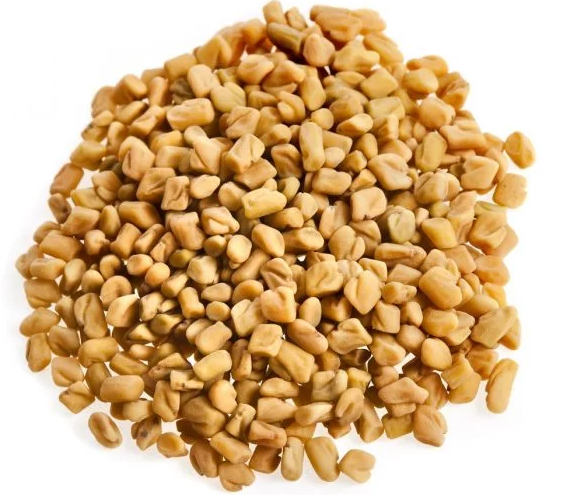 The health benefits of fenugreek include relief from anemia, loss of taste, fever, dandruff, stomach disorders, biliousness, respiratory disorders, mouth ulcers, sore throat, diabetes, inflammations, wounds, and insomnia. It is beneficial in lactation and helps in improving digestion, and is used in hair care. It is also shown to reduce cholesterol levels and protect heart health, while simultaneously boosting the immune system and protecting against flu and various infections.
The health benefits of fenugreek include relief from anemia, loss of taste, fever, dandruff, stomach disorders, biliousness, respiratory disorders, mouth ulcers, sore throat, diabetes, inflammations, wounds, and insomnia. It is beneficial in lactation and helps in improving digestion, and is used in hair care. It is also shown to reduce cholesterol levels and protect heart health, while simultaneously boosting the immune system and protecting against flu and various infections.
Fenugreek is an annual plant that is also known as methi in many places of the world. It is native to the Middle and Near East and is widely used in the Indian subcontinent. It has small round leaves and that can be dried. There is even evidence that the ancient Egyptians understood the benefits of fenugreek since its seeds have been found in tombs, particularly of Tutankhamen.
Health Benefits Of Fenugreek
The health benefits are explained in greater detail below.
Good for Breastfeeding Mothers
India traditional Ayurvedic physicians prescribe fenugreek to nursing mothers. This benefit is attributed to the presence of diosgenin in it. This can help increase the amount of milk that is produced by the breasts, and the magnesium and vitamin content of fenugreek also help improve the milks quality to keep the infant healthy.
Reduces Menstrual Discomfort
Fenugreek is considered as a potent substance that eases the process of menstruation and relieves the associated symptoms. It is an emmenagogue, which means that it can open up obstructed menses to make the most feminine of processes work smoothly and comfortably.
Minimizes Symptoms of Menopause
Fenugreek contains the chemicals diosgenin and estrogenic isoflavones, which are similar to the female sex hormone, estrogen. Loss of estrogen causes menopausal symptoms. So, eating it helps reduce menopausal symptoms like mood swings, depression, cramps, and abnormal hunger pangs. It helps monitor a number of other hormones as well, keeping many other bodily processes in line as well.
Lowers Cholesterol Levels
Research studies show that fenugreek consumption helps reduce cholesterol level. It helps reduce the level of low-density lipoprotein (LDL cholesterol) significantly, which can prevent various conditions like atherosclerosis, heart attacks, and strokes. It is a rich source of fiber, which scrapes excess cholesterol off of the arteries and blood vessels of the body. By reducing cholesterol content in the bloodstream, you reduce the chances of clots forming or becoming stuck in the vessels.
 Reduces Cardiovascular Risks
Reduces Cardiovascular RisksThe seeds contain 25% galactomannan. This is a type of natural soluble fiber which specifically relates to a reduction in cardiovascular diseases.
Controls Diabetes
Fenugreek helps alleviate type II diabetes. According to one study, it may also help people with type I diabetes. Studies by Indian researchers revealed that fenugreek added to the diet of type I diabetes patients helped to drop urinary sugar level by 54%. Because of the presence of the natural fiber galactomannan, fenugreek slows down the rate at which sugar is absorbed into the bloodstream.
A certain amino acid (4-hydroxyisoleucine) in fenugreek induces the production of insulin so therefore, 15-20 grams of fenugreek is recommended for controlling blood sugar on a daily basis. By slowly releasing insulin to the body rather than in massive chunks, the overall bodily function is improved, and the plunges and peaks of blood sugar cease to be an issue for diabetics.
Relieves Sore Throat
Fenugreeks soothing mucilage helps relieve a sore throat, associated pain, and cough.
Relieves Constipation
It adds bulk to the stool due to its high fiber content. This also makes it helpful in treating constipation and diarrhea, while also relieving minor indigestion.
Prevents Colon Cancer
Fenugreek possesses anti-carcinogenic potential. The steroid diosgenin in fenugreek has been specifically linked to colon cancer prevention. Furthermore, various non-starch polysaccharides like saponins, hemicellulose, mucilage, tannin, and pectin, lower cholesterol levels and inhibit bile salts from being reabsorbed by the colon. This can bind to the toxins and protect the colons mucous membrane, which can reduce colorectal cancer and other conditions that can negatively affect the colon.
Word of Caution: The only side effect seen in people taking high doses of fenugreek is mild gastrointestinal distress. It is not recommended during pregnancy because it may lead to miscarriage due to its strong effect on the female reproductive system.
Side effects include diarrhea, stomach upset, bloating, gas, and a "maple syrup" odor in urine. Fenugreek can cause nasal congestion, coughing, wheezing, facial swelling, and severe allergic reactions in hypersensitive people. Fenugreek might lower blood sugar.
Your Health Is Our Concern!
Mawuena Workartey/ Ghanahospitals.org